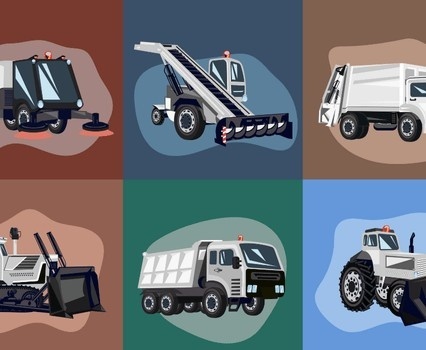Who Really Leads Italy’s Electric Utility Vehicle Race? It’s Not Who You Think

In analyzing Italy's Electric Utility Vehicle (EUV) market comprising purpose-built electric vehicles used in commercial logistics, municipal operations, mining, gated campuses, airports, and low-emission delivery zones a targeted survey was conducted involving 850 decision-makers, including fleet managers, municipal procurement heads, industrial operators, and last-mile logistics coordinators across five key regions: Lombardy, Emilia-Romagna, Lazio, Veneto, and Piedmont.
The study reveals a unique recall and perception pattern that diverges significantly from mainstream automotive trends. Unaided brand recall, where respondents named EUV brands without prompts, was led by Piaggio Commercial Vehicles, particularly for its Porter NP6 Electric, with 32% recall, followed by Alké at 21%, recognized for its all-terrain and modular EUVs used in municipal and industrial settings. Goupil (France-based but with an Italian presence) was mentioned by 17%, while Renault and Iveco, often misperceived as dominating the electric LCV market, only saw 11% and 9% recall respectively reflecting a gap in visibility within the specific utility context. Other brands like Addax Motors and Green-G Electric Vehicles were present but had minimal spontaneous recall (<5%).
In aided brand recall, where a structured list of 10 EUV-specific manufacturers was shared, Piaggio saw a jump to 71% recognition, while Alké rose to 59%, Goupil to 53%, Renault to 41%, and Iveco to 39%. Notably, lesser-known but segment-relevant brands like Esagono Energia, Melex, and Club Car showed recognition in niche segments like campus mobility and mining but not in mainstream commercial logistics. Top-of-mind recall i.e., the first brand mentioned—was again led by Piaggio (28%), followed by Alké (19%), suggesting that national origin, historical presence, and municipal visibility influence immediate brand memory in this segment.
Regarding brand perception attributes, brands were rated across key operational criteria: durability, payload efficiency, energy economy, after-sales service, customization, and eco-compliance. Alké emerged as the most rugged and versatile, scoring 8.6/10 on durability and 8.4 on adaptability, especially among mining and public works fleet managers. Piaggio led in service availability (8.7) and cost-efficiency (8.3), indicating strong support infrastructure. Goupil scored highest in low-emission compliance and urban fit (8.1), being favored in cities like Milan and Bologna where tight emission regulations apply. Renault was noted for brand trust (7.9), but scored lower on customization and fit-for-purpose design, revealing its weaker positioning in utility-specific contexts.
Emotional connection with the brand, assessed using a five-dimensional affinity index (trust, familiarity, story resonance, national pride, and brand personality fit), showed Piaggio leading with an emotional score of 74/100, largely due to its Italian heritage, long-standing presence in municipal fleets, and storytelling around “sustainable Italian engineering.” Alké followed at 69/100, appreciated for its specialized identity and reliability in demanding environments. Goupil and Iveco scored in the 50–60 range, being seen more as utilitarian than emotionally compelling, while newer or foreign-origin brands like Addax, Melex, and Green-G scored below 50 due to limited narrative reach or branding in Italy.
A perception vs. brand positioning gap analysis exposed several misalignments. Renault, for instance, positions itself globally as a commercial EV solutions provider, but only 44% of Italian utility fleet respondents perceive it as utility-suited, often viewing it as too “passenger-derived.” Similarly, Iveco, traditionally dominant in combustion engine logistics, struggles to translate that reputation into electric utility perception, with only 37% seeing them as a top-tier EUV player. Piaggio was the most aligned, with 67% of respondents stating it delivers on what it promises in terms of maneuverability, modular payload systems, and serviceability. Alké, though well-perceived for performance and durability, suffers from a perception of premium pricing, seen as “fit for institutions but not for everyday fleet budgets.”
In terms of brand personality mapping, based on Aaker’s five dimensions (Sincerity, Excitement, Competence, Sophistication, Ruggedness), brands displayed distinct profiles. Alké ranked high in ruggedness (8.8) and competence (8.2), closely associated with “dependable,” “tough,” and “industrial-grade.” Piaggio was strongest in sincerity (8.4) and competence (8.1), with consistent associations to “practical,” “Italian,” and “fleet-friendly.” Goupil emerged high on eco-conscious sophistication (7.6), but lower in ruggedness (6.1), suggesting alignment with light-duty, urban-focused operations. Renault and Iveco were seen as competent but lacking emotional or distinctive personality traits, reflected in lower scores for excitement (5.9 and 5.6, respectively).
Summary: Italy EUV Brand Perception Landscape
For complete data write your queries at: sales@marksparksolutions.com
Total Sample Size: 850 Respondents
|
Category |
Sample Size |
Description |
|
Fleet Managers (Private Sector) |
220 |
Logistics companies, industrial parks, warehouses using EUVs for delivery and operations. |
|
Municipal & Public Sector Fleet Heads |
180 |
City councils, sanitation departments, park authorities, utility service coordinators. |
|
Procurement Officers (Industrial/Mining) |
140 |
EUV buyers for mining, quarries, ports, and manufacturing logistics. |
|
Facility & Campus Operations Managers |
110 |
Managers of airports, universities, factories, and resorts using EUVs onsite. |
|
Last-Mile Delivery Operators |
100 |
Small delivery firms using electric utility vehicles in urban environments. |
|
Electric Vehicle Dealers & Distributors |
60 |
Insights from authorized dealerships, franchise operators, and importers. |
|
Technical/Field Service Leads |
40 |
Maintenance heads and technical teams who influence replacement and upkeep decisions. |
No FAQs available at the moment.